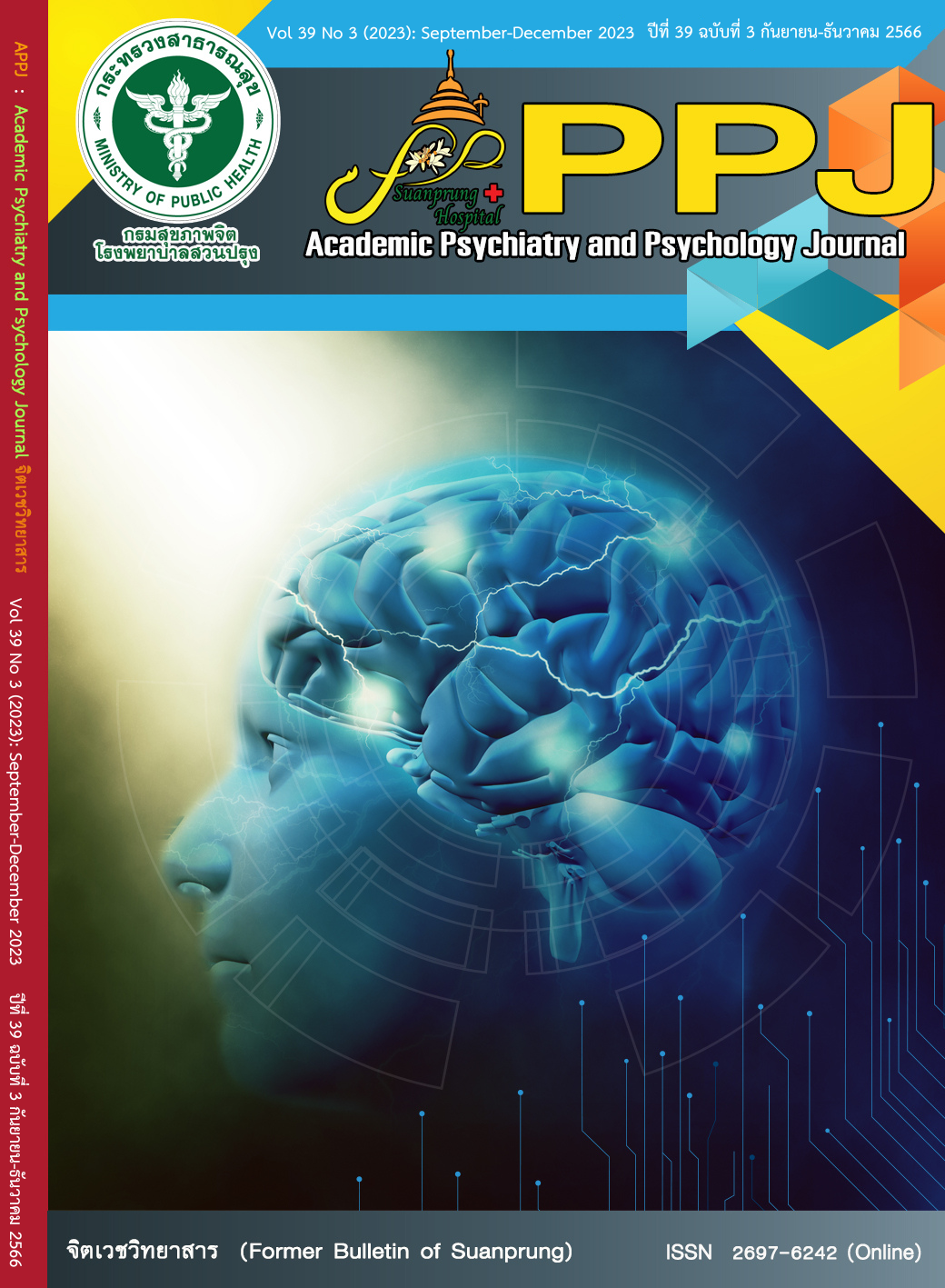Development of a Mental Health Chatbot (Nong Hug Chatbot) for Secondary School Students in Chiang Rai
Main Article Content
Abstract
Objective: To design and develop the chatbot (Nong Hug Chatbot) for students in grades 7-12 to access the assessment and take primary care of their mental health and mood. Users' satisfaction with the chatbot was also examined.
Materials and methods: The researchers developed a smartphone chatbot using the LINE application to mediate between users and automated interaction systems. The Artificial Intelligence Psychological Intervention Open Platform was used to create the psychological intervention tools. Mental health status was assessed through a menu of activities such as the Thai version of the Depression Anxiety Stress Scale (DASS-21). The chatbot also offered relaxation techniques for users to choose from. The form and performance of the chatbot program were evaluated for improvement by the mental health tech team. Data were collected from 1-31 December 2022 to assess satisfaction after use. Data were analyzed using descriptive statistics and presented as percentages, mean, and standard deviation.
Results: Of the 29,748 students, 434 (1.5%) used the chatbot. Most of them used it for general conversation (56.4%) and to assess their mental health (43.6%). 72.8% of them used it once. The mental health problems of the users were anxiety (87.7%), depression (66.1%), and stress (54.0%). The majority of respondents had no problems in using the application (74.5%). Participants reported a high level of user’s satisfaction (mean=3.38, SD= 0.66).
Conclusion: The Nong Hug chatbot application can be well used to address the basic mental health of students in grades 7-12. Participants were highly satisfied with all aspects of the application.
Article Details

This work is licensed under a Creative Commons Attribution-NonCommercial-NoDerivatives 4.0 International License.
บทความหลังผ่านการปรับแก้จากกองบรรณาธิการแล้ว เป็นลิขสิทธ์ของวารสารจิตเวชวิทยาสาร โรงพยาบาลสวนปรุง กรมสุขภาพจิต กระทรวงสาธารณสุข ห้ามเผยแพร่เพื่อประโยชน์ทางการค้าโดยไม่ได้รับอนุญาต แต่อนุญาตให้เผยแพร่บทความดังกล่าวเพื่อประโยชน์ทางการศึกษาแก่ประชาชนทั่วไป ทั้งนี้กองบรรณาธิการไม่จำเป็นต้องเห็นด้วยกับบทความหรือข้อคิดเห็นใดๆ ที่ปรากฏในวารสารสวนปรุง
References
Panyawong W, Santitadakul R, Pavasuthipaisit C. Prevalence of depression and suicidal risks in Thai Adolescents: a survey in school from 13 Public Health Region. Journal of Mental Health of Thailand [Internet]. 2020 [cited 2022 Aug 12];28:136-49. Available from: https://he01.tci-thaijo.org/index.php/jmht/article/view/210760/164768 (In Thai)
Kongprapun N. Factors influencing adolescent depression case study: Rajamanga University of Technology Suvarnabhumi. Journal of Social Science and Buddhistic Antropology [Internet], 2020 [cited 2023 May 4];5:302-15. Available from: https://so04.tci-thaijo.org/index.php/JSBA/article/download/246966/167909/864307 (In Thai)
Panyawong W, Pawasuthipaisit C, Santitadakul R. Development of the Thai version of the Patient Health Questionnaire for Adolescents (PHQ-A). Mental Health Knowledge Base [Internet]. 2018 [cited 2019 May 1]. Available from: https://dmh-elibrary.org/items/show/395 (In Thai)
Department of Mental Health, Ministry of Public Health. Suicide report [Internet]. 2022 [cited 2022 July 1]. Available from: https://dmh.go.th/report/suicide/ (In Thai)
Ministry of Public Health. Ministry of Public Health examination report form year 2021 Issue 4: Mental Health: Suicide, Health Area 1. 2021:8 (In Thai)
Chiang Rai Provincial Public Health Office. Annual Performance Report Form 2021. 2021:10 (In Thai)
Department of Mental Health. Department of Mental Health Annual Report 2018 [Internet]. 2018 [cited 2022 July 1]. Available from: https://dmh-elibrary.org/items/show/188 (In Thai)
Department of Mental Health. Department of Mental Health Annual Report 2019 [Internet]. 2019 [cited 2022 July 1]. Available from: https://dmh-elibrary.org/items/show/189 (In Thai)
Department of Mental Health. Department of Mental Health Annual Report 2020 [Internet]. 2020 [cited 2022 July 1]. Available from: https://dmh-elibrary.org/items/show/334 (In Thai)
Department of Mental Health. Department of Mental Health Annual Report 2021 [Internet]. 2021 [cited 2022 July 1]. Available from: https://dmh-elibrary.org/items/show/1298 (In Thai)
Chaiprakarn W, Kanjanakaroon R, Pongkaew W, Lotrakul M. Characteristics of attempted suicide patients presenting to Chiang Rai Prachanukroh Hospital during 2012-2016. Chiang Mai Medical Journal [Internet]. 2018 [cited 2023 May 4];58:57-67. Available from: https://www.med.cmu.ac.th/bscm/files/2022/11 /CMMJ_2019_58_1_No-7_p57-68.pdf (In Thai)
Kumar V, Sattar Y, Bseiso A, et al. The Effectiveness of internet-based cognitive behavioral therapy in treatment of psychiatric disorders. Cureus 2017;9:e1626. doi:10.7759/cureus.1626
General Administration Division. Jubjai: An interactive robotic system to monitor people with depression on social networks. Mahidol University [Internet]. 2018 [cited 2023 May 12]. Available from: https://mahidol.ac.th /th/2018/jubjai-bot/ (In Thai)
General Administration Division. Distance carefully (Psyjai). Mahidol University [Internet]. 2022 [cited 2023 May 12]. Available from: https://op.mahidol. ac.th/ga/posttoday-29/ (In Thai)
Wongpatikaseree K, Yomaboot P, Noohom N, Yuenyong S, Pakdeesatitwara N, Taewijit S, et al. A study of effects of using Choojai artificial intelligence robot for elderly on mental health level of geriatric in elderly care center: a pilot study. NBTC Journal [Internet]. 2021 [cited 2023 May 13];58:57-67. Available from: https://so04.tci-thaijo.org/index.php/NBTC_Journal/article/download/248270/172971/930364 (In Thai)
Budsabok S, Pechpong N , Singtokaeo C. Development of chatbot application for student services case study: Division of Student Development Rajamangala University of Technology Suvarnabhumi. Research Journal Rajamangala University of Technology Thanyaburi [Interne]. 2020 [cited 2022 Aug 12];19:85-94. Available from: https://ph01.tci-thaijo.org/index.php/rmutt-journal/article/download/240597/165310/843107 (In Thai)
Oei TP, Sawang S, Goh YW, Mukhtar F. Using the Depression Anxiety Stress Scale 21 (DASS-21) across cultures. Int J Psychol 2013;48:1018-29. https://doi.org/10.1080/00207594.2012.755535
Rathnayaka P, Mills N, Burnett D, Silva DD, Alahakoon D, Gray R. A mental health chatbot with cognitive skills for personalised behavioural activation and remote health monitoring. Sensors 2022;22:3653. https://doi.org/10.3390/s22103653
Dosovitsky G, Bunge E. Development of a chatbot for depression: adolescent perceptions and recommendations. Child and Adolescent Mental Health 2022;28(1). doi:10.1111/camh.12627
Abd-Alrazaq AA, Rababeh A, Alajlani M, Bewick MB, Househ M. Effectiveness and safety of using chatbots to improve mental health: Systematic review and meta-analysis. J Med Internet Res 2020;22(7):e16021. doi:10.2196/16021

